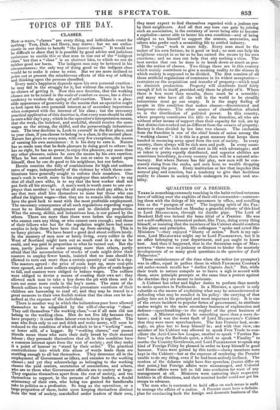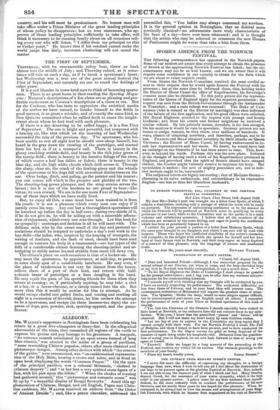QUALITIES OF A PREMIER.
THERE is something extremely touching in the habit retired veterans have of talking over the exploits of their old commander—contrast- ing them with the doings of his successors in office, and extolling him as the "paragon of men." The inspiring spirit of the PAL- MERSTON organ breathed on Monday a graceful tribute of this kind to Lord MELBOURNE, through its ductile pipe. The Lord of Brockett Hall was indeed the beau ideal of a Premier. He was not a self-sufficient, tyrannical pedant, like PEEL, doing every thing himself, or insisting that the members of his Cabinet should conform to his plans and principles. His colleagues "spoke and acted like Ministers "—they enjoyed "liberty of action." Such is my opi- nion, Lord MELBOURNE might say to Lord PALMERSTON, but it is an affair belonging to your department, and you ought to know best. And thus it happened, that in the Saturnian reign of MEL- BorninE "there was no jealousy or distrust to hinder the masterly developments of so many great questions in the speeches of Lord Palmerston."
These reminiscences of the time when the writer (or prompter)
was in office, equal in pathos those in which FENIMORE COOPER'S old sutler-wench recalls her " darlint Captain Jack." But, while their truth to nature compels us to heave a sigh in accord with them, stern principle prompts at the same time a protest against the doctrine they are meant to insinuate.
A Cabinet has other and higher duties to perform than merely
to make speeches in Parliament. In a Minister, a speech is only valuable as the means of explaining what may be misunderstood or defending what may be assailed in his policy : the carrying of that policy into act is his principal and most important duty. It is one of the errors incident to popular forms of government, to attribute undue weight to the mere secondary business of explanation and defence—speechmaking—to the neglect of the great business of action. A Minister ought to be something more than a mere de- bater; and it was the worst fault of Lord MELBOURNE'S Cabinet that they were mere speechmakers. The late Premier had, seem- ingly, no plan but to keep himself in ; and with that view, one member of his Cabinet was allowed to speak Free Trade to con- ciliate the Anti-Corn-law League, another to speak "Further Re- form" to keep the Radicals quiet, a third to speak " Finality " to soothe the Country Gentlemen, and Lord PALsiEasvox to speak any kind of Foreign Policy he pleased in order to keep himself in good humour. Votes were gained by this tactic—showy members were kept in the Cabinet—but at the expense of rendering the Premier unable to do any thing, even if he had been actively inclined. The readers of the debates might have fine speeches, (tastes differ on that point,) but Foreign affairs were mismanaged, and Colonial and Home affairs were left to fall into confusion for want of any management at all. Ministers were cantering their respectlye hobbies in all directions, and their nominal leader could not get his troops to advance. The man who is contented to hold office on such terms is unfit to manage the affairs of a nation. A Premier must have a definite plan for conducting both the foreign and domestic business of the
country, and his will must be predominant. No honest man will take office under a Prime Minister of the great leading principles of whose policy he disapproves; but no true statesman, who ap- proves of those leading principles sufficiently to take office, will think it necessary to be running fussily about on all occasions tell- ing every one who will listen, "I differ from my principal on this or Vother point." He knows that if his conduct cannot make the world judge him fairly, incessant chattering will not mend. the matter



























 Previous page
Previous page